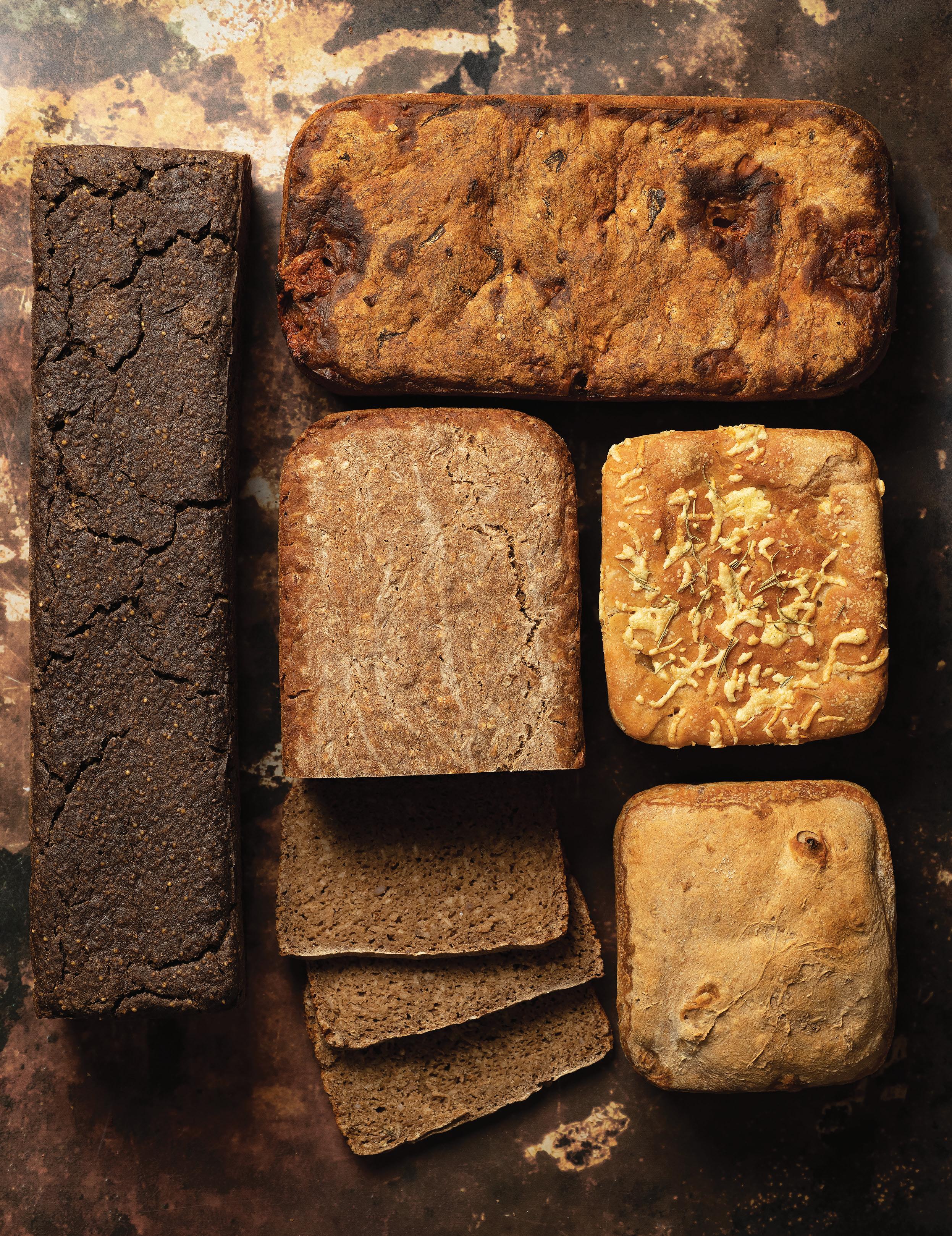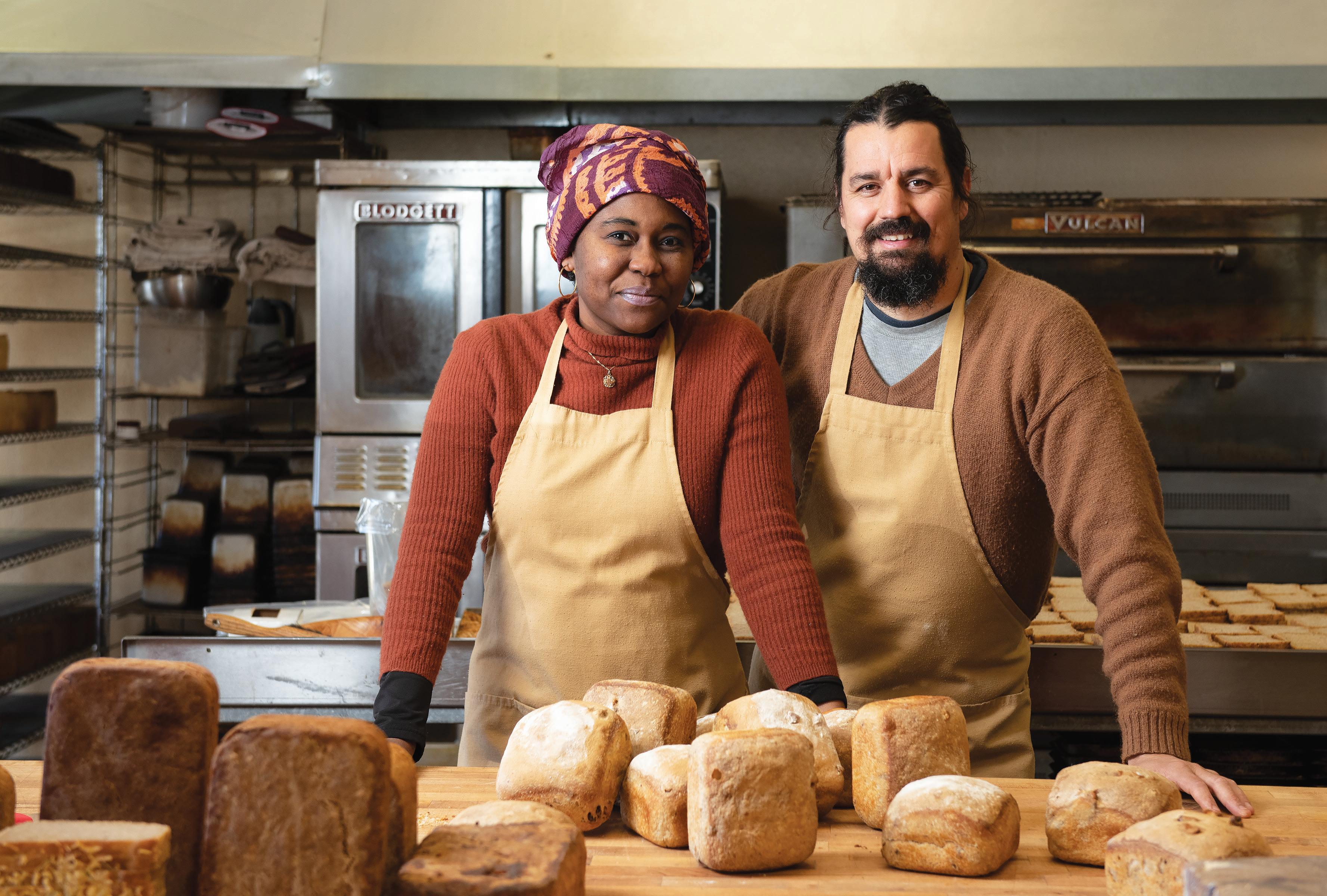
4 minute read
FORTIFYING THE GRAIN CHAIN
WILD LEAVEN BAKERY WANTS TO STRENGTHEN THE LOCAL FOOD ECONOMY IN NORTHERN NEW MEXICO, ONE LINK—AND LOAF—AT A TIME
By Ellie Duke · Photos by Douglas Merriam

Jessica and Andre Kempton at Wild Leaven Bakery in Taos.
The loaves of bread lining the shelves at Wild Leaven Bakery in Taos don’t look like the loaves you’ve likely seen at other artisanal bakeries. Instead of a round-topped boule, they are shaped into long rectangular bricks—that is, tender, moist bricks made from organic heirloom grains. Andre Kempton, head baker and co-owner with his wife, Jessica, started baking his bread in blocks so it could be easily and uniformly sliced for sandwiches, as well as for efficiency—the shape lends itself to less wasted space in the oven.
This sort of attention to detail and creativity is indicative of Kempton’s holistic approach to baking and business. Everything in the bakery’s Taos storefront is handled and sourced with care, from the grains to the vegetables in the daily soup specials to the ceramic bowls and plates and hand-carved wooden spoons (made by Dixon farmer and potter Pete Duggan and La Villita farmer Ron Boyd, respectively). The folks at the helm of Wild Leaven clearly see themselves not just as bakers, but as a link in the grain chain—the path from seed to table, via farmer and miller and baker and grocer—and they are invested in strengthening that chain, and the local food economy at large.

Loaves of bread at Wild Leaven Bakery.

Andre Kempton slicing bread.
The importance of a healthy and resilient local food economy became clearer than ever amid the COVID-19 pandemic, Kempton said. “Because our food system got so stressed, we realized that we need to be a little more prepared and work on building the connections between everyone involved. We play our role in that and we want to continue to work on providing more food security for the region. Our goal is not necessarily to grow bigger and bigger outside of the state, but to try to grow what we have here, to try to provide for the people that we have here.”
Indeed, Wild Leaven has its hands full with demand for bread in New Mexico. In addition to their Taos space, Kempton recently opened a production space in Santa Fe to keep up with demand for the bakery’s wholesale accounts in Santa Fe and Albuquerque.
Before starting Wild Leaven, Kempton apprenticed at Cloud Cliff Bakery in Santa Fe, under the tutelage of Willem Malten, who “has an intuition of bread baking,” Kempton said. “There were never strict recipes. . . . [Malten] doesn’t really have a scientific approach to bread making. It is more of an artist’s approach.”
Though Kempton has struck out on his own and developed his own style of bread, that artistry has stuck with him. He described the twenty-four-hour fermentation process, a unique hallmark of Wild Leaven breads, as “a dance, and something that has taken years and years to learn.” Many factors affect the fermentation process, such as moisture, temperature, and time, and Kempton is constantly experimenting with striking the perfect balance.
Wild Leaven, which is named for its use of wild or natural yeast rather than commercial leavening yeast, specializes in long-fermentation sourdoughs using organic, local grains. The twenty-four-hour fermentation process has health benefits, Kempton explained, like easier digestion and lower glycemic index numbers, as well as practical ones, like a longer shelf life. During the fermentation process, the yeast and bacteria in the dough begin to eat the protein and carbohydrates in the flour and release byproducts like carbon dioxide, acids, and alcohols. This breakdown makes it easier for the human body to absorb the nutrients in the grains. Most of the rising happens due to the release of carbon dioxide in the fermentation process, which is one of the reasons Wild Leaven breads maintain their signature rectangle shape while baking, instead of inflating in the oven.
Kempton collaborates with local farmers and millers in northern New Mexico and southern Colorado to help promote the growth of heirloom spelt, rye, and White Sonora wheat. These varieties have “unique flavor and unique texture that you don't find in plain old modern wheat,” said Kempton. For example, Wild Leaven helped Big Wheel Farm in Costilla source Sonora wheat seeds from Arizona, and is now buying twenty thousand pounds of that wheat for their breads. Wild Leaven mills some of their grain in-house, but they also work with millers like Mountain Mama Milling in Monte Vista, Colorado, a stone mill that mills wheat flour for a variety of local heritage grain farmers.
If you stop by Wild Leaven for the bread, you’ll stay for the other treats and surprises. The pecan chile bar is an irresistibly chewy, lightly spicy, perfectly sweet treat that left me with red-tipped fingers and a watering mouth. When I visited, I lunched on delicious potato soup made with Taos Farmers Market vegetables, a bottle of homemade kombucha, and a scoop of vegan chai coconut cream ice cream that was so simple and divine I could hardly believe it. I took home a loaf of green and red chile cheese bread that disappeared in mere hours.
Kempton says the Taos Farmers Market has been essential for the bakery through the challenges of the pandemic. “The [market] was a huge blessing for our community,” Kempton said. “All summer we were at the farmers market while we closed the retail for six months. We had so much support there.” He and Jessica do most of their shopping at the market, both personally and for the bakery. And “it’s not just about selling bread,” said Jessica, but about the community they have there. “It’s about connecting with friends,” she said.

